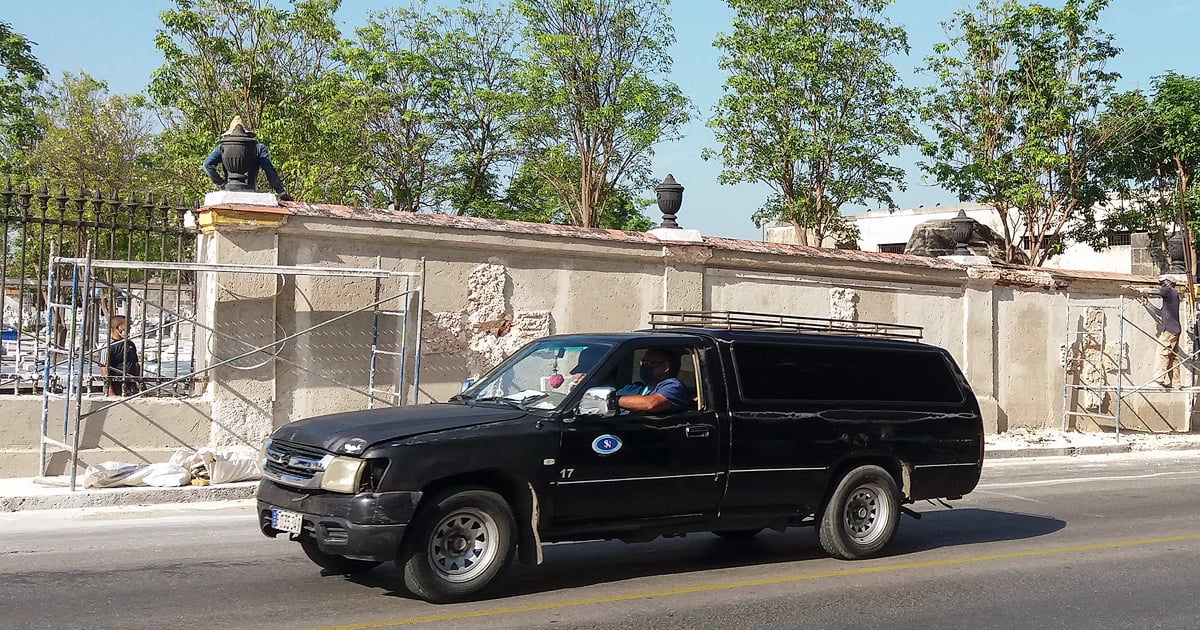A Cuban woman reported this Sunday the excruciating wait for a funeral car in Havana, describing a desperate and lamentable situation for her family. Eniabel Montero Sánchez shared in the Facebook group “Madres cubanas por un mundo mejor” that after reporting the death of a loved one, the body remained at home for 16 hours because the funeral car did not arrive from 7 PM until 5 AM.
Montero expressed her frustration and sadness on social media: “A body of a drowned person that decomposes quickly, nothing matters in this country, not even the deceased can be at peace with their families.”
The complainant described the anguish of the family, who spent hours watching an empty table and some wreaths while waiting for the funeral car to pick up the body, which had already been cleared by legal medicine.
In another post, the woman explained that since 2:35 PM, they had been at the funeral home waiting for the body to hold a wake and give it a proper burial. However, no one had provided an explanation for the delay: “They tell you the car is on its way, but it’s a lie. Since it's not their relative, it’s fine. This is incredible; not even the dead are respected.”
The uncertainty about whether they would have time to say goodbye to their loved one added more pain to the situation, Montero noted. She also strongly criticized the funeral and necrological services in the City of Havana, questioning the lack of responses and the insensitivity of those responsible: “I am grateful to the Attorney General of the Republic for her support in calling the direction and complaining on my behalf, but the human insensitivity is so great that since they are not their relatives, it does not matter,” she expressed bitterly. “The only thing missing is for them to charge us for the car.”
Montero also conveyed her understanding that cars can have mechanical problems, given that her own profession is related to vehicles, but insisted that a response should always be provided, even if it’s late. “I want to watch over my relative, not an empty table.”
The complaint highlights a critical and painful situation that affects many families in Cuba, reflecting problems in the management of essential services during moments of great emotional vulnerability.
The funeral crisis in Cuba has left scenes in different cities across the country, such as a broken-down funeral car in the middle of a street in Santiago de Cuba. Journalist Yosmany Mayeta shared an image on Facebook of a funeral car broken down near Plaza de Marte. Although he did not specify whether the vehicle was transporting a body, the post underscores the current crisis in funeral services in the eastern province.
The daughter of the late actor Carlos Massola reported that the funeral car took seven hours to arrive to collect her father’s body. In a Facebook post, the young woman expressed her desperation, saying she did not understand how this could happen. Her father passed away at dawn at his home in Havana, and by 5 PM, the funeral car had still not arrived.
Crisis in Funeral Services in Cuba
This section addresses frequently asked questions regarding the ongoing crisis in funeral services in Cuba, providing insights into the challenges and the impact on families.
What caused the long wait for the funeral car in Havana?
The delay was due to the inefficiency and poor management of funeral services in Havana. Despite promises that the car was on its way, it took hours for it to arrive.
How did the delay affect the family?
The family experienced significant emotional distress, waiting for hours to hold a wake and give a proper burial, while dealing with the uncertainty and lack of respect for their deceased loved one.
Is this issue common in other parts of Cuba?
Yes, similar issues have been reported in other cities, such as Santiago de Cuba, where a broken-down funeral car was seen on a street, highlighting a broader crisis in funeral services across the country.
What actions have been taken to address the problem?
Some individuals, including the Attorney General of the Republic, have intervened by contacting responsible authorities. However, the systemic issues and human insensitivity have yet to be adequately addressed.
